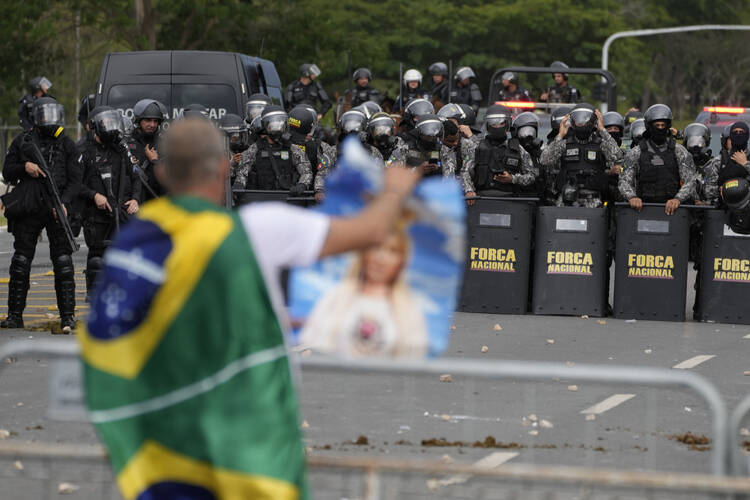Months after the defeat of former President Jair Bolsonaro and one week after the inauguration of President Luiz Inácio Lula da Silva, thousands of pro-Bolsonaro protesters stormed the National Congress building, Presidential Palace and Supreme Court in Brazil’s capital city on Jan. 8.
The mob called on the nation's military to oust Mr. Lula and reinstate Mr. Bolsonaro; the former president has close ties to the military and has sown doubt about the integrity of the election for months.
Catholic leaders both in Brazil and internationally condemned the disturbances in Brasília.
Catholic leaders both in Brazil and internationally condemned the disturbances in Brasília. The National Conference of Brazilian Bishops issued a statement deploring the violence and calling for “serenity, peace and the immediate cessation of criminal attacks on the rule of law.”
The conference urged the criminal prosecution of those who participated in the attack.
The Indigenous Missionary Council also deplored the civil disorder, calling the riots a confirmation of “the legacy of destruction, fascism and authoritarianism” from the presidency of Mr. Bolsonaro. Noting that the Indigenous Missionary Council was founded by bishops during Brazil’s military dictatorship, the council described the attacks in Brasília as an attempted coup and reaffirmed a call for peace and democracy.
In a statement on Twitter, the archbishop for São Paulo, Cardinal Odilo Scherer, said that the riots were “unacceptable” and called for mutual respect.
“This has no place in democratic coexistence,” Cardinal Odilo Scherer tweeted on the day of the riots.
“This has no place in democratic coexistence,” the cardinal tweeted on the day of the riots. The Archdiocese of Brasília, where the riots took place, reposted the C.N.B.B.’s statement on its Instagram account, however, Archbishop Paulo Cezar Costa, who has most recently been seen in Rome for the funeral of Pope Benedict XVI, has not made any public comment regarding the riots.
Two lay Catholic organizations in Brazil—the National Council of the Laity of Brazil and Signis Brasil—issued similar statements to the C.N.B.B., calling for civil peace and the arrest and prosecution of the rioters and those who financially backed them. Signis Brasil even referred to the riots as “acts of terrorism” in its comments. Both of these groups' statements were amplified by the C.N.B.B. on its website.
In an address to members of the diplomatic corps at the Holy See on Jan. 9, the day after the unrest in Brasília, Pope Francis noted the political crises emerging from the Americas, specifically citing the events in Brazil and more bad news about political violence and instability coming out of Peru and Haiti. He highlighted the need to overcome partisan ways of thinking that are occurring on the continent in order to promote the common good.
“A sign of the weakening of democracy is heightened political and social polarization, which does not help to resolve the urgent problems of citizens,” Pope Francis said. “I think of the various countries of the Americas where political crises are laden with tensions and forms of violence that exacerbate social conflicts.”
Material from the Associated Press and OSV News was used in this report.







